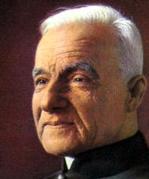Fathers of the Church
Epistle II: to Felix, Bishop, and Cyriacus, Abbot
Description
This epistle is from Book V of the
Register of the Epistles of Saint Gregory the Great. Januarius had been given the reponsibility of assisting Theodosia in building a monastery in honor of her late husband's wishes. Unfortunately, the two did not seem to get along very well in this endeavor. Prompted by Theodosia's complaints about Januarius' behavior, Gregory orders Felix and Cyriacus to investigate the accusations and correct all wrongs, and also to speedily set the new monastery in order. For previous letters to Januarius on this subject see Epistles VIII and XV, Book IV.
Provenance
St. Gregory (b. 540 in Rome) was elected pope at the age of 50, serving from 590 to 604. In 14 years he accomplished much for the Church. England owes her conversion to him. At a period when the invasion of the barbarian Lombards created a new situation in Europe, he played a great part in winning them for Christ. At the same time, he watched equally over the holiness of the clergy and the maintenance of Church discipline, the temporal interests of his people of Rome and the spiritual interests of all Christendom. He removed unworthy priests from office, forbade the taking of money for many services, and emptied the papal treasury to ransom prisoners of the Lombards and to care for persecuted Jews and victims of plague and famine. Gregory also reformed the liturgy, and it still contains several of his most beautiful prayers. The name "Gregorian chant" recalls this great Pope's work in the development of the Church's music. His commentaries on Holy Scripture exercised a considerable influence on Christian thought in the Middle Ages. Following his death in 604, his numerous epistles, including the following letter, were compiled into the Papal Register of Letters.
by Gregory the Great in 590-604 | translated by James Barmby, D.d
Gregory to Felix, &c.
The tenor of the report submitted to you sufficiently explains the complaint of the religious lady Theodosia, in which we have found on reading it many heads of accusation, not befitting priestly gentleness, against our brother and fellow-bishop Januarius; so much so that, after the foundation by her of a monastery for servants of God, all that pertains to avarice, turbulence, and wrong is said to have been exhibited at the time of the very dedication of the oratory. Wherefore, if the case is as we find in her aforesaid representation, and if you are aware that anything at all unbecoming has been committed besides, we exhort you that, all wrongs having first been redressed, you press upon Musicus, the abbot of the monastery of Agilitanus, that he lose no time in giving the greatest attention to his monks whom he had began to settle there, to the end that, this venerable place being with the Lord's help set in order by you in a decent and regular manner, neither may we be disturbed by the frequent complaints of the aforesaid religious lady that her good desires are not fulfilled, nor may it be to the detriment of your soul that so pious a design should languish, as we do not believe it will, through any neglect of yours.
Taken from "The Early Church Fathers and Other Works" originally published by Wm. B. Eerdmans Pub. Co. in English in Edinburgh, Scotland, beginning in 1867. (LNPF II/XII, Schaff and Wace). The digital version is by The Electronic Bible Society, P.O. Box 701356, Dallas, TX 75370, 214-407-WORD.
To Fathers of the Church home page






